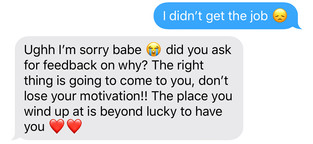If anyone is job searching right now, I can totally relate to the fact that it is a struggle. I started my job search in early 2020. I was just casually looking the first couple months of the year, hoping to have something lined up by spring/early summer. Little did I know that Covid- 19 would completely disrupt that plan. In this post, I want to explain what my application process was like in a difficult job market, how I stayed positive, what I struggled with, and tips for successfully landing my current position.
Don't put all of your eggs in one basket
Admittedly, the biggest mistake I made in my job search was that with every interview I got, I slowed down, or even completely halted submitting applications to other organizations. With each initial interview, I would get so excited about the prospect of being hired by a company I really wanted to work for, that I stopped moving forward in the process. Although I think it was a good thing that I was only applying to positions I felt I really would be excited to accept, I would immediately get too attached to the idea that it would be "the one." Because the job market was/is more stringent with hiring in addition to an influx of applicants, the interview process was competitive to put it mildly. My advice to anyone currently applying/interviewing would be to continue applying at the same rate once you have an interview as you were before. This will allow you to keep up the momentum and have good alternates on deck if you are not selected during a given interview process.
Have a plan, but don't get comfortable
What I mean by this is that for me personally, I really didn't anticipate my application process to take as long as it did (nearly six months). With that being said, I overestimated what I would need to have lined up financially in order to be completely fine if the process ended up being longer than I had hoped. I left my last position on August 1, and hoped that I would have a job secured quickly with having extra time to focus on my search. It ended up taking me a month and half before receiving the offer that I ultimately accepted, but I was thankful that I had the flexibility to allow for a longer search if needed. Not everyone is able to plan this out and I do feel incredibly lucky that I was able to. With that said, I still knew I didn't have forever to make this work. Even though it was a decent window of time, I still felt the clock ticking every day. This is where not getting comfortable comes into play. Could I have waited until I had an entire year of expenses in savings before quitting my job? I could have. But the way I looked at it was this: I knew I wanted to move to a new city by the end of the year, and for multiple reasons it was now or never on that front. If I gave myself the hard deadline of 1/1/2021 to have a job I wanted in Boston, I wasn't going to let myself fail at that. There's a Julius Caesar quote that was adopted by Tony Robbins (with a few choice words added) that rang true to me throughout this process: "If you want to take the f***ing island, burn your f***ing boats..." While this is a little more extreme than what I actually did, it's true that if your back is against the wall, you're going to figure out how to make it work.
There's no hack to feel more comfortable interviewing
Before my first couple of interviews, I scoured the internet to learn "how to not be nervous for an interview." My searching yielded answers that mostly consisted of "practice and practice again." While I 100% did prepare and practice for my interviews, which does help, this wasn't the answer I was hoping for. Although it's not the answer that I and most people that are already nervous want to hear, it really is the truth. Interviewing is a skill that you're not going to get better at until you just do them, and do them multiple times. There's really no better way to learn how to improve your interview skills, then seeing what does and doesn't land in actual interviews. It was tough, but I had to learn to embrace those uncomfortable feelings. Did I say some borderline (ok, blatantly) stupid things in my first couple interviews? Yes, absolutely. I let myself turn red and then I moved on. In the next interview, I was that much stronger for it.
Have tenacity
I interviewed with my current company back in July. I had an amazing interview experience with all of people I spoke to, and left each round of interviewing thinking, "I NEED to work there." I felt really strongly about the company, and really liked their people. When I found out I wasn't selected, I was a little crushed. I really felt it was the perfect position and company, but I understood that sometimes things don't work out. A couple months later, I sent an email to the company explaining that although it didn't work out last time, these were the reasons why I felt I was the perfect fit. A few weeks later, I completed a new round of interviewing and I was hired with the company. Was my email the sole reason that I was hired? No. But, having the resilience to reach out after not being selected the first time showed that I was tenacious and really wanted the position. I think this is a admirable quality in any candidate. Just like anything in life, you have to fight for what you want.
Interviewing tips that I think are most helpful
Make sure you are actually answering the interviewer's question. This is something that I struggled with in the beginning. I would let my nerves take over, and blurt out an answer that either wasn't relevant to the question, or went in a circle around the question. It's like word vomit and when you're finally done, you think, "WTF just came out of my mouth?" Take a breath, think about the question being asked, and use specific examples that support your answer. If you finish and still feel like you didn't answer sufficiently, be open about that and ask if you can reframe your answer. The interviewer wants to see that: 1) you're capable of answering their questions, and 2) you can regroup and reframe your answer to be clearer.
Don't make the interview all about you. Something that I struggled with in the beginning was making the interview about what x company could provide me with vs. skills that I could bring to them. You definitely want to make sure that you are getting what you need out of a given opportunity, but I had the best outcomes when I shifted the focus to specific examples of way that you contribute value to a team, rather than the list of things I wanted from them. As Gary Vee would say, "Want leverage? Bring Value! Based on what they value, not what you want to give."
Use specific examples and make connections. I also really struggled in the beginning with providing specific and tangible examples of past experiences that related to the position I was interviewing for. I started going through all the skills that I knew were desirable for the position I was going for. Then went through my most significant past experience and drew parallels to how that experience was applicable to what I would be doing in the prospective position. Also, I quickly realized that beyond providing relevant examples, you want to explain the outcome of the example you're providing. This gives the interviewer a clearer picture of your abilities and what you can bring to the table in the role they're hiring for.
Don't dwell on disappointment
One thing I really had to overcome throughout the process was not letting myself get consumed with disappointment every time a job didn't work out. This is way easier said than done, but one thing that really helped get out of my own way was relying on the people I knew would keep me in a positive and optimistic headspace. I was lucky enough to have my family, friends, and Anthony to talk me off of a ledge whenever I needed it. I leaned on the people that I knew only had my best interest at heart, and would support me through the times where I started to take not getting a job personally. I highly urge anyone in this position to do the same. For me, having a good support system during this time made all the difference. I wanted to include a couple pictures to prove my point with this one. Words of encouragement along the way kept me motivated. Plus, sometimes I really just needed someone to tell me to pick myself up and get over it.
If you're currently going through the process of finding a new job, try to remember that it's a difficult process in general, but even more difficult right now. Try to not be too hard on yourself, and remember that sometimes things that don't work out, end up being for the best. Feel free to comment on anything that helped you through the process, whether it be an interviewing tip or how you kept positive!
















תגובות